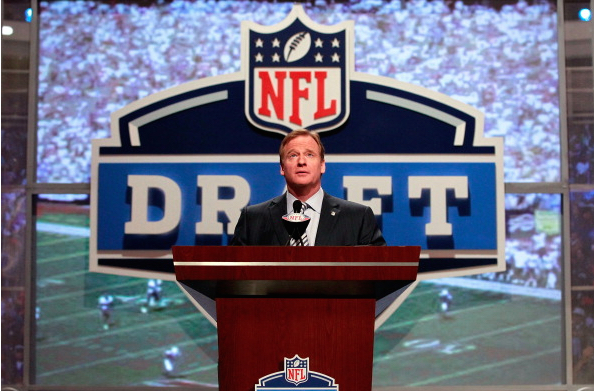The manner in which leagues punish their players for off the field/court/rink transgressions has drawn much attention and criticism in the recent past. All of you know about Ray Rice and I am sure many of you know about Greg Hardy, and before him players like Ben Roethlisberger, Latrell Sprewell and even Pete Rose. All of these instances collectively present a difficult problem for their respective sports and the organizations that attempt to govern them. How do you punish players when no two instances of player misconduct are the same?
Sports are governed by rules during their games. The fans know those rules because they are well defined. Three strikes and you’re out. False start? Five yards. Six fouls = foul out of the game. There is no arguing the rule and even when there is an argument, it is about the interpretation of a rule violation that all fans know and can understand. Baseball understood this when it finally addressed PED use. It gave guidelines for what happens after each PED violation[1] and there was no arguing once the system was implemented.
However, there is no rubric for off the field crime when it comes to punishing players within the framework of professional athletics. Sure there are sentencing guidelines in criminal law but those are debated and vary state to state often times. Isn’t a DUI with a 0.08 BAC far different from a DUI with a 0.21? Ray Rice knocked his now-wife out cold and dragged her out of an elevator like a slab of meat. How do you compare that with Donte Stallworth’s vehicular manslaughter or Michael Vick’s dog killing criminal enterprise?
Those of you who are familiar with my way of thinking know that I believe that identifying a problem is only half of the work. We must propose solutions. This situation is no different.
In the legal world we have different standards of proof. For instance, in most civil cases, the plaintiff need only prove his or her case by a preponderance of the evidence. “Preponderance of the evidence” requires that the jury or the decider of fact must believe that the existence of a fact is more probable than its nonexistence. In other words, just over 50/50 or more likely than not gets it done in most civil cases.
In criminal law, the defendant must be proven guilty beyond a reasonable doubt. According to my handy dandy Black’s Law Dictionary, reasonable doubt is defined as “the doubt that prevents one from being firmly convinced of a defendant’s guilt, or the belief that there is a real possibility that a defendant is not guilty.” The prosecution has a mountain-sized burden to overcome in criminal trials.
That gap in burdens of proof has led us to situations where defendants like O.J. Simpson walk free in criminal court but are forced to give up their entire net worth, give or take, in a civil court. In dealing with athletes who are alleged to have committed crimes off the field, which standard is a professional league to apply? Criminal or civil? Do we want a system where O.J. is allowed to come back and play football the day he is acquitted? Do we instead want a system where it only has to be more likely than not that someone violated a criminal statute to have him forfeit his right to earn a living in a given professional sport?
Some of you might be thinking, but what if the person isn’t even charged? That analysis gets even messier. District attorneys don’t like losing high profile cases and as we have seen across the country, criminal justice is not meted out necessarily fairly or efficiently. Do we want to put the fate of an athlete’s career in a politician whose job it is to get convictions and who eyes re-election? Do we want to put it in the hands of a police force? That doesn’t seem right, does it.
But wait, there is another burden of proof we have yet to look at. There’s an in-between. Here in California, for instance, to get punitive damages for say fraud in a civil court, the fact finder must find as much by clear and convincing evidence.[2] Going back to the handy dandy Black’s Law Dictionary[3], we find that clear and convincing evidence is defined as “evidence indicating that the thing to be proved is highly probable or reasonably certain.” This is a greater burden than preponderance of the evidence, the standard applied in most civil trials, but less than evidence beyond a reasonable doubt, the norm for criminal trials.
That sounds more like it. If it is determined that an athlete highly probably committed an act or it is reasonably certain that he did so, that would seem to rule out the “iffy” factor and it would also not make it near-impossible to punish an athlete for something he most likely did, but not necessarily did beyond a reasonable doubt.
Let’s take a current example that we previously referenced: Greg Hardy. Mr. Hardy is alleged to have engaged in the following:
Hardy, Holder said, flung her from the bed, threw her into a bathtub, then tossed her on a futon covered with rifles. Holder said Hardy ripped a necklace he had given her off her neck, threw it into a toilet and slammed the lid on her arm when she tried to fish it out.
The 6-foot-4, 265-pound Hardy dragged her by the hair room to room, she said, before putting his hands around her throat.
“He looked me in my eyes and he told me he was going to kill me,” said Holder, 24, who said she used to live with Hardy.
“I was so scared I wanted to die. When he loosened his grip slightly, I said, ‘Just do it. Kill me.’ ”[4]
That is not your run of the mill transgression by any means. And if you thought Ray Rice was bad, and it was, if Hardy did in fact commit the above, how bad would that videotape look? Furthermore, if we are reasonably certain that Mr. Hardy committed the above-referenced acts, how does one just look at a predetermined punishment table and decide that “six games for first domestic violence violation” is fitting?
The answer is that a predetermined punishment table is not going to work, so how do we implement the “clear and convincing” system that I decided on? I’m glad you asked.
Obviously just letting Roger Goodell determine guilt and the punishment is not the way to go, so I propose that we let professionals handle this. Get three former judges or litigators to act as a panel where a 2/3 majority carries the day. The professional leagues should have no problem employing such personnel and I promise you there will be a long list of people applying for such a job. Then you have the players union and the league agree on this panel of three, give the panel members a one term job for five years so they’re not worried about playing politics with either the players or owners side, and voila, you have your conduct panel.
To summarize, a panel of three former judges/litigators will decide whether an athlete committed a particular act using the “clear and convincing evidence” burden of proof. Then, the panel of three will agree upon a punishment that they deem fit. In order to do so, the players and leagues will have to agree upon what rules of evidence are applied but I believe we have to require the particular athlete to testify on his own behalf, under oath, with attorney representation of his choosing. And if you’re thinking that every single DUI and bar fight will have to go through this rigorous process, you’re wrong. Remember that the sentencing committee will look much more favorably when determining a punishment if the offender admits his wrong and shows remorse for his actions.
However, please don’t forget that this whole column is based upon the false premise that the professional leagues should be policing off the field/court conduct. We have a criminal justice system, the best in the world by all accounts. We have civil courts. So why do leagues need to police their players? The answer is that they do it for the image of their leagues and the almighty dollar. So, taking into account that leagues want to police their players, the above is my solution as to how they should do so.
[1] Someone will still have to explain to me how A-Rod got punished and what he was punished for, but otherwise, the PED rules are clear and have been applied accordingly.
[2] This is an over-simplification but I figured nobody wanted two paragraphs on punitive damages in California.
[3] Don’t worry, not all of my columns will be this technical and law-oriented.
[4] http://www.charlotteobserver.com/news/local/crime/article9140591.html




















Pingback: Random Thoughts… | Rudin Writes
Pingback: Reforming How the NFL Handles Domestic Violence - Rudin Writes
Pingback: Amy Trask Should Be the Next Commissioner of the NFL - Rudin Writes